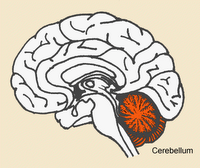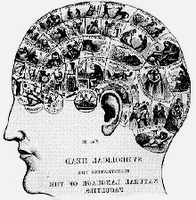As noted in a
prior post, there has been a recent firestorm surrounding the controversial
Dore Achievement Centers cerebellum-based treatment approach to severe reading disabilities (
dyslexia). The
Myomancy blog has been particularly prominent in covering the controversy and issues surrounding the cerebellum-based Dore Achievement Centers treatment. Given the role of the
cerebellum in certain forms of mental/interval time-keeping, I find this controversy and surrounding research of interest.
The mental/interval time-keeping research has
implicated the cerebellum in behaviors that operate at the millisecond range of time keeping, but not at the interval levels. I think this point may be relevant to the whole Dore controversy. As
summarized previously, more complex cognitive behaviors (e.g., reading) most likely involve
both the
millisecond and i
nterval level time-keeping systems. The interval level system appears to be important for such cognitive abilities as
working memory and
executive function, higher-level cognitive functions important for intelligence and achievement.
Thus, if a treatment for dyslexia is based ONLY on the millisecond system (primarily the cerebellum), it is not surprising that there is controversy. Such a brain-based treatment may only be focusing on one brain-related component for reading....while ignoring others (cognitive abilities and functions more dependent on the interval timing system).
This hypothesis is supported by a recent meta-analysis re: the role of
impaired balance (due to the cerebellum) and developmental dyslexia. The reference and abstract (and URL link) are provided below. Bottom line--according to this meta-analysis and the mental/interval time-keeping research presented previously at this blog---a treatment focused only on the functions/abilities mediated by the cerebellum is likely only touching on a small portion of the complex set of abilities involved in reading. Brain-based treatments for reading (and other academics) most likely need to also include activities that address cognitive abilities mediated by
cognitively controlled interval time-keeping brain mechanisms. I believe the article speaks for itself (
although I have added emphasis via italics).
- Rochell, K. & Talcott, J. (2006). Impaired balance in developmental dyslexia? A meta-analysis of the contending evidence. Journal of Child Psychology and Psychiatry, 47(11), 1159–1166 (click here to view)
Abstract
- Background: Developmental dyslexia is typically defined by deficits in phonological skills, but it is also associated with anomalous performance on measures of balance. Although balance assessments are included in several screening batteries for dyslexia, the association between impairments in literacy and deficits in postural stability could be due to the high co-occurrence of dyslexia with other developmental disorders in which impairments of motor behaviour are also prevalent. Methods: We identified 17 published studies that compared balance function between dyslexia and control samples and obtained effect-sizes for each. Contrast and association analyses were used to quantify the influence of hypothesised moderator variables on differences in effects across studies. Results: The mean effect-size of the balance deficit in dyslexia was .64 (95% CI ¼ .44–.78) with heterogeneous findings across the population of studies. Probable co-occurrence of other developmental disorders and variability in intelligence scores in the dyslexia samples were the strongest moderator variables of effect-size. Conclusions: Balance deficits are associated with dyslexia, but these effects are apparently more strongly related to third variables other than to reading ability. Deficits of balance may indicate increased risk of developmental disorder, but are unlikely to be uniquely associated with dyslexia. Keywords: Meta-analysis, dyslexia, attention-deficit/hyperactivity disorder, balance, postural stability. Abbreviations: ADHD: attention deficit, hyperactivity disorder; DCD: developmental coordination disorder; FSIQ: full-scale intelligence quotient.
Technorati Tags:
psychology,
educational psychology,
school psychology,
neuropsychology,
neuroscience,
reading,
dyslexia,
Grw,
cerebellum,
brain fitness,
Dore,
Dore Achievement Centers,
intelligence,
cognition,
mental time keeping,
interval timing,
temporal tracking,
time perception,
balancepowered by performancing firefox
















